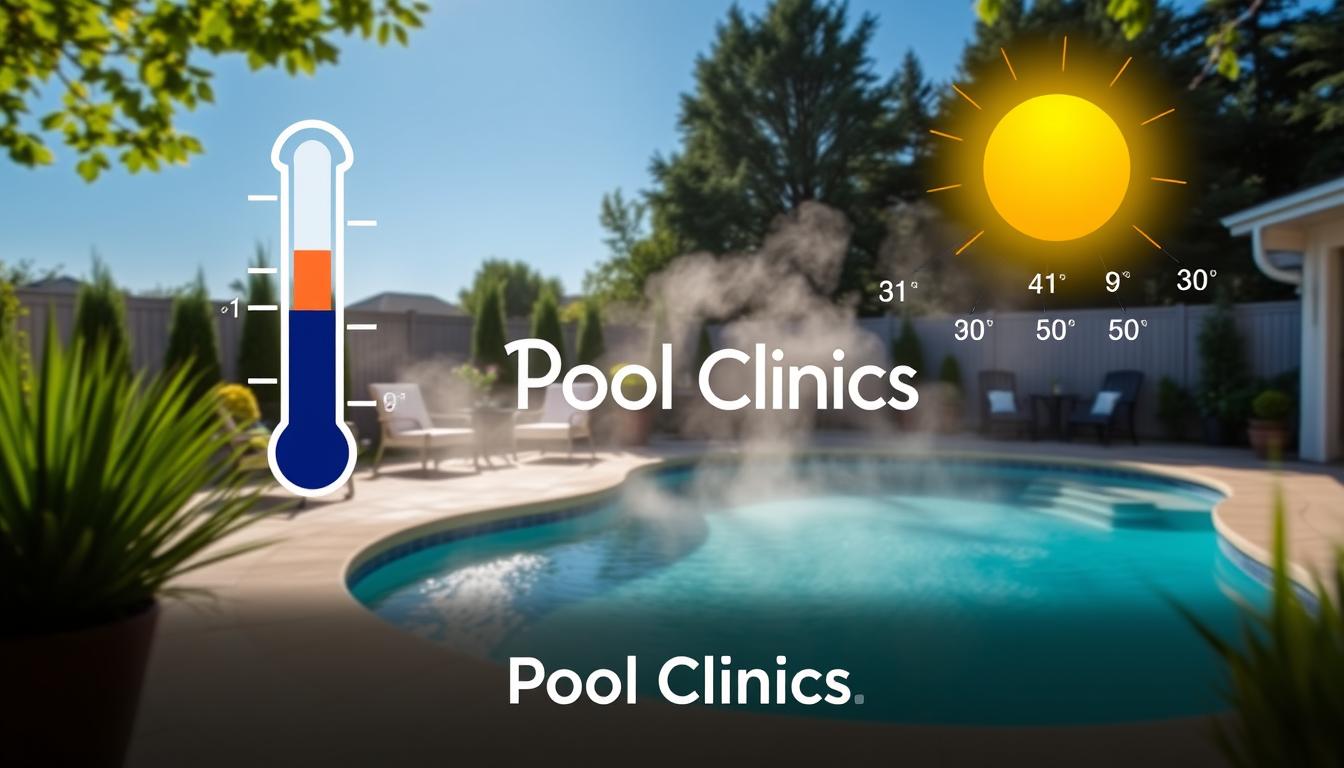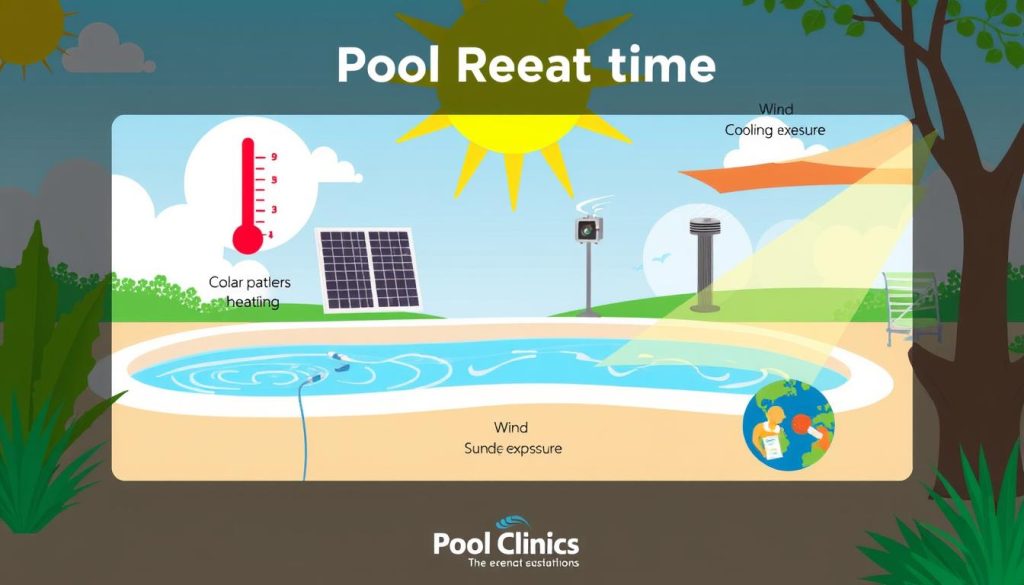
Summer’s coming, and we’re excited to jump into warm pools. But waiting for the pool to heat can be annoying. Knowing what affects heating time helps us plan better.
Understanding pool heating is key for both new and experienced pool owners. It helps maximize fun and keep energy costs down. Let’s explore what impacts heating time and the systems available.
We’ll look at factors affecting pool heating and various heating systems. You’ll learn what to expect when heating your pool. This guide will help you make the most of swim season.
Key Takeaways:
- Pool heating time depends on factors like pool size, heating system, starting temperature, and environmental conditions.
- Gas heaters are the fastest, taking 8-12 hours, while electric heaters and heat pumps take longer.
- Solar heaters are eco-friendly but rely on sunlight, while electric resistance heaters suit smaller pools.
- Proper sizing, installation, and maintenance of the heating system are crucial for efficiency and cost-effectiveness.
- Understanding pool heating time helps plan ahead and maximize enjoyment of your swimming pool.
Factors Influencing Pool Heating Time
Several key factors affect how long it takes to heat your swimming pool. Knowing these elements helps you plan better and make smart choices about pool heating.

Pool Size and Volume
Pool size greatly impacts heating time. Larger pools need more time to warm up due to increased water volume. More water requires more British Thermal Units (BTUs) to raise the temperature.
| Pool Size (Gallons) | Temperature Increase | Heating Time (Sunny Regions) | Heating Time (Cooler Regions) |
|---|---|---|---|
| 10,000 | 10-15°F | 1-2 days | 3-5 days |
| 20,000 | 10-15°F | 2-4 days | 3-5 days |
Heating System Type
The heating system type greatly influences pool warming time. Gas heaters work quickly, while heat pumps are energy-efficient. Electric heaters fall in between, taking 12 to 24 hours.
Solar heaters and electric resistance heaters are less common but can suit specific pool setups.
Starting Water Temperature
Initial water temperature is crucial in determining heating time. A big gap between current and target temperatures extends the process. The heat pump must transfer more heat to bridge this gap.
Desired Temperature Increase
The desired temperature rise directly affects heating time. Raising water by 10 degrees is faster than increasing it by 20 degrees. Larger temperature differences take longer to achieve.
A premium-grade pool heat pump like AquaCal can warm a swimming pool to between 78°F and 104°F, typically raising the temperature by 30 degrees Fahrenheit in ideal conditions.
Environmental Conditions
Air temperature, humidity, and pool surroundings impact heating efficiency. Shade from trees or buildings can increase heating time. Direct sunlight helps minimize warming time.
Inground pools benefit from earth insulation, while above-ground pools lose heat quickly through exposed walls.
- Using a pool cover can increase heat pump efficiency and maintain water temperature with less energy.
- AquaCal warranties for their pool heat pump series range from 7-10 years, ensuring long-lasting performance.
how long does it take to heat pool
Heating your pool takes different amounts of time based on your chosen system. Let’s look at various options and their heating times.
Gas Heaters: 8-12 Hours
Gas heaters are the fastest way to warm your pool. They usually take 8 to 12 hours to reach the desired temperature. These heaters are great for quick use or in colder areas.
Electric Heaters: 12-24 Hours
Electric heaters come second in speed, taking 12 to 24 hours. They work well for smaller pools or where gas isn’t available. However, they might cost more to run than other methods.
Heat Pumps: 24-48 Hours
Heat pumps are energy-efficient but slower, needing 24 to 48 hours or more. They pull heat from the air and move it to the water. Though slower, heat pumps save money over time due to lower energy use.
These pumps can be up to 600% efficient. They create 6 units of heat for each unit of electricity used.
Solar Heaters: Variable Based on Sunlight
Solar heaters use the sun’s energy to warm pool water. Their heating time changes based on available sunlight. In sunny weather, they keep pools comfy. On cloudy days, heating takes longer or needs extra help.
Pool size affects heating time:
| Pool Size | Heating Time |
|---|---|
| Small (up to 55,000 liters) | 24-72 hours |
| Medium (55,000-115,000 liters) | 48-96 hours |
| Large (over 115,000 liters) | 72-120 hours |
To save energy, use a thermal pool cover. It can cut heat loss by 70% when the pool’s not in use. Smart thermostats help too, reducing energy use by up to 15% through better temperature control.
Conclusion
Pool heating involves many factors, including size, heater type, and environmental conditions. Selecting the right heating system is crucial for efficiency. Proper sizing and maintenance help extend the swimming season.
Regular maintenance is key for uninterrupted performance. This includes cleaning the heat pump and filter. Winterizing equipment also ensures optimal energy efficiency.
Modern technologies like inverter heat pumps can reduce energy loss. They also lower noise levels and offer WiFi control. These features make pool heating more convenient.
PVC slat covers help retain heat and minimize energy use. Maintaining optimal temperatures is important for peak performance. Water is much denser than air, so proper heating is crucial.
Understanding pool heating helps create a comfortable swimming environment. By applying expert advice, pool owners can maximize efficiency. This leads to extended pool seasons and more enjoyment.







